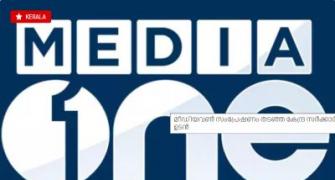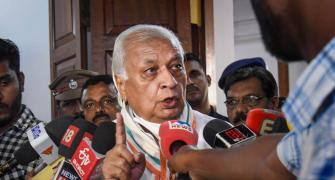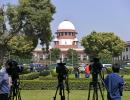Criticism of governmental policy cannot be termed "anti-establishment", the Supreme Court said on Wednesday while quashing the Centre's telecast ban on Malayalam news channel MediaOne and pulling up the home ministry for raising national security claims from "thin air" without facts.

Observing that the State can't impose unreasonable restrictions on the press as it will have a chilling effect on press freedom, a bench headed by Chief Justice DY Chandrachud set aside the Kerala high court order which had upheld the Centre's decision to ban the telecast on security grounds.
The top court pronounced its judgment on a plea by the news channel.
The high court had relied on material which was disclosed solely to the court in a sealed cover by the Union ministry of home affairs and said the MHA decision to deny security clearance was based on intelligence inputs received from various agencies.
In a judgment spanning 134-pages, the SC said the Union of India has raised the claim of national security in a "cavalier manner" and the report of the Intelligence Bureau is purely an inference drawn from information that is already in the public domain.
"There is nothing 'secretive' about this information to attract the ground of confidentiality. Additionally, it cannot be argued that the purpose of national security will be served by non-disclosure merely by alleging that Madhyamam Broadcasting Limited (channel) is involved with Jamaat-e-Islami Hind which is an organisation with alleged terrorist links.
"We also hold that national security claims cannot be made out of thin air. There must be material backing such an inference," the bench said.
The court said critical views of the channel on policies of the government cannot be termed anti-establishment.
"The use of such a terminology in itself represents an expectation that the press must support the establishment. The action of the ministry of information and broadcasting by denying security clearance to a media channel on the basis of the views which the channel is constitutionally entitled to hold produces a chilling effect on free speech, and in particular on press freedom.
"Criticism of governmental policy can by no stretch of imagination be brought within the fold of any of the grounds stipulated in Article 19(2) of the Constitution," the bench said.
Blasting the Centre for submitting the material in a sealed cover, the apex court said non-disclosure of reasons for denial of security clearance and disclosure only to court in sealed cover has violated principles of natural justice.
It said a blanket immunity from disclosure of all investigative reports cannot be granted.
"We are of the opinion that the respondents by not providing a reasoned order denying the renewal of license, not disclosing the relevant material, and by disclosing the material only to the court in a sealed cover have violated the appellant's right to a fair hearing protected under Article 21 of the Constitution.
"The respondents were unable to prove that the restrictions on the appellants' right to a fair hearing were reasonable. Therefore, the order of the ministry of information and broadcasting dated 31 January 2022 denying permission for renewal of the license and the judgment of the division bench of the high court dated 2 March 2022 must be set aside on the ground of the infringement of procedural guarantees," the bench said.
Batting for press freedom, the bench, also comprising Justice Hima Kohli, said an independent press is necessary for a robust democracy.
"An independent press is vital for the robust functioning of a democratic republic. Its role in a democratic society is crucial for it shines a light on the functioning of the state. The press has a duty to speak truth to power, and present citizens with hard facts enabling them to make choices that propel democracy in the right direction.
"The restriction on the freedom of the press compels citizens to think along the same tangent. A homogenised view on issues that range from socioeconomic policy to political ideologies would pose grave dangers to democracy," the bench said.
Noting that Jamaat-e-Islami Hind was banned last in 1992 which was nullified in 1994, the top court said the alleged link of the channel's shareholders to the organisation is not a legitimate ground to restrict the rights of the channel.
"Thus, when JEI-H is not a banned organisation, it would be rather precarious for the State to contend that the links with the organisation would affect the sovereignty and integrity of the nation, the security of the State, friendly relations with foreign states, or public order," it said.
The court said the only piece of evidence in the file to link MBL to the organisation is the alleged investment in the shares of MBL by cadres of JEI-H, however, there is no evidence on record to link them.
The apex court said courts should appoint an amicus curiae to assess the claims of confidentiality and assist the court in coming out with a reasoned order.
"The appointment of an amicus curiae will balance concerns of confidentiality with the need to preserve public confidence in the objectivity of the justice delivery process.
"The amicus curiae appointed by the court shall be given access to the materials sought to be withheld by the State. The amicus curiae shall be allowed to interact with the applicant and their counsel before the proceedings to ascertain their case to enable them to make effective submissions on the necessity of disclosure," the bench said.
The top court had in an interim order on March 15 stayed until further directions the January 31 directive of the Centre revoking the licence of the news channel and banning its telecast on security grounds.
It had said the news and current affairs channel would continue its operations as it was prior to the ban of telecast.
The top court had passed the order after perusing the files submitted by the Centre on the basis of which the channel's security clearance was revoked and the Kerala high court passed the order upholding the ban on telecast.









